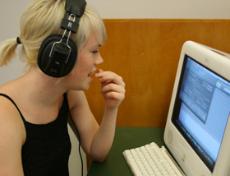While proposals to revive long-silent WLDC 640 are awaiting final approval, many Loyola students are taking matters into their own hands and making themselves heard in another way.
With the help of Mark Glynn of NewOrleansRadio.com and Music Industry Studies Director John Snyder, students are able to broadcast their own radio programs on the Internet.
Glynn, a part-time instructor in the College of Music and Fine Arts, put his idea of online radio to work in 1996 as a commercial venture independent of Loyola. Now the Web site is part of a nationwide network, with networks in Mississippi, Indianapolis and Pennsylvania, including local networks in St. Tammany Parish.
As part of the Entrepreneurial Unit, a series of programs at Loyola that mimic corporations and provide students with real-world, hands-on experience, the radio is an opportunity for students to create and broadcast their own radio shows every week. The broadcasts took off earlier this semester and students have since produced four weeks of programming.
“Since these shows can be distributed and aired to any online station, we try to focus on good content,” Glynn said. “There is less focus on where it’s being distributed. This is a great place to create content, work out the kinks and try out a non-traditional radio setup.”
“I found out about the program in an e-mail,” said Music Industries Studies sophomore John Vo. Vo’s alternative-talk program, “The Vo Show,” is his opportunity to “do something different,” he said. “I had an interest in radio, so I signed up.”
“I wanted a work study job that would coordinate with my major,” said Music Industries Studies freshman McClain Johnson, “so I got involved and came to the first meeting, and they said they were looking for shows.”
Johnson’s “Eclectic Selection” program broadcasts a diverse selection of music, while other programs, like Music Industries Studies sophomore Tara Curtis’ “All the Songs in My Head,” feature a collection of indie-rock and 80s pop, or the jazz and spoken word of Music Industries Studies sophomore Ted Long’s “Second Set.”
Others programs include Music Industries Studies junior Kenny Wuerstein’s “Ken FM,” Music Industries Studies sophomore George Stathakes’ “Dark End of the Street,” featuring selected artists and guest hosts, and Music Industries Studies junior Ben Lorio’s “Good Music Radio Hour,” with weekly themes ranging from “Blacksploitation funk to 90s one-hit wonders,” according to Lorio.
Whether they are using semi-professional equipment or just a computer microphone and the home-recording software GarageBand, students are able to produce their broadcasts in their own time without a studio or DJ booth.
“Me and two other guys use a digital 8-track,” Vo said. “We record a few voice tracks, pick 13 or 14 songs, put them in order, and record them from the computer.”
“I make a playlist on my iTunes and play with it throughout the week,” Johnson said. “Then I just record a few seconds of voice tracks. All we really need is just our (Apple) Powerbooks, GarageBand and some sound effects.”
From there, the MP3 files are sent to Glynn and uploaded to the server to be broadcast online.
These students, however, expected more than a simulated live broadcast. “I would like for this program to go live,” Curtis said. “Having a live radio would be a lot more fun.”
While much of mainstream radio uses pre-recorded material, Glynn is hoping to move the broadcast into “traditional stations where you can get behind the microphone in a live setting. Right now, we’re working on having a production room, where we can use professional equipment,” he said.
The vacant radio studio on the fourth floor of the Communications/Music complex is home to WLDC, which Glynn hopes to merge with the success of NewOrleansRadio.com.
“Space would be nice, more than anything,” Glynn said. “I don’t believe it would be difficult for people to donate and see the potential for a Loyola radio.”
While the department of Music Industries Studies awaits an official decision on the future of WLDC, Glynn is relying on student enthusiasm for the success of Loyola’s radio program.
“The reason this program exists is because every one of these students is finding a way to record and get it done,” Glynn said. “I’m just the catcher – they keep sending me the content and I will keep producing it.”
“For us Music industry kids who have a real passion for music, this is a chance for us to get our voices out there,” Johnson said. “We’re really into it.”
Alex Woodward can be reached at adwoodwa@loyno.edu.






